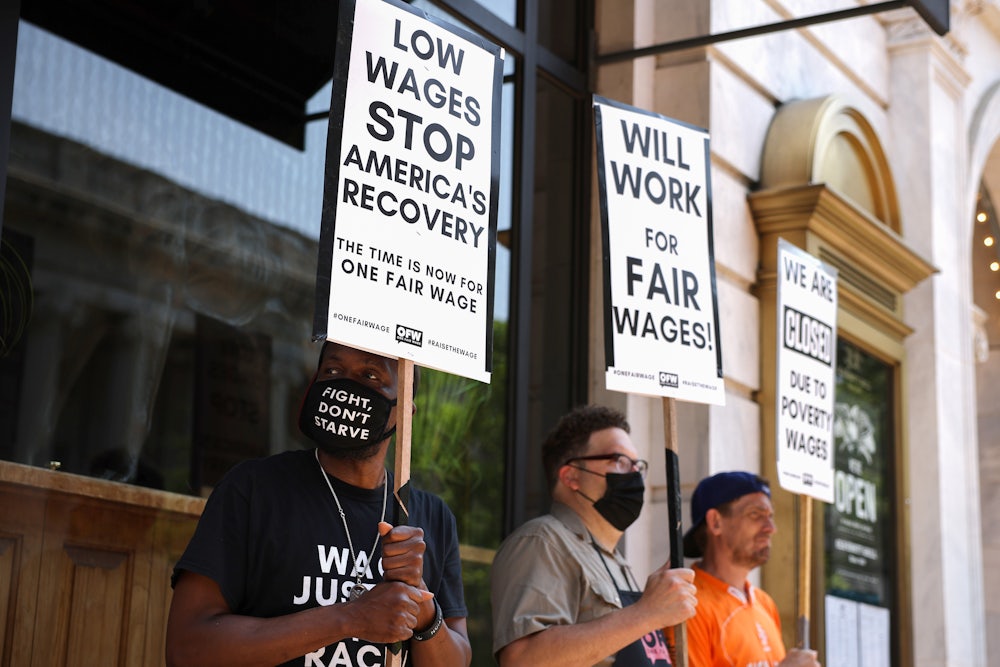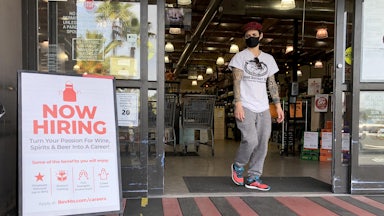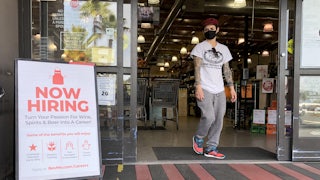I write these words on Labor Day, a holiday that President Grover Cleveland decided should come around in September rather than May because he worried about the socialist connotations of May Day and the fact that May 1 was too close for comfort to the anniversary of the Haymarket affair, which happened on May 4, 1886.
We’ve long since ceased celebrating labor in this country. In fact, what we mostly do now is talk smack about workers of all kinds. This has taken on a special ferocity in right-wing circles since the onset of the pandemic and the government’s response. The checks the government has been sending people, according to the right, prove that America’s working poor are a burden—a bunch of indolent do-nothings who’d rather sit at home and collect a government check than be out there in the world sprinkling salt crystals on pretzels or wiping down the leatherette interiors at the local car wash.
I take the opposite view. The fact that people would rather cash a government check than perform menial, underpaid work is an encouraging sign. It’s a form of protest against the way our economy has evolved over the last 40 years, and it’s a welcome development that we can only hope forces a change in the way our corporate and political classes think about labor.
I’ve been cogitating along these lines for months, but now an officially smart and credentialed person has come along and said it. If you missed the op-ed in the Times over the weekend by the renowned MIT economist David Autor, you need to give it a read. He corrects a few key misconceptions—untruths that are spouted as gospel on cable news—and he offers a radical new thesis on why the current labor shortage is in fact a good thing.
First of all, Autor writes that, conventional wisdom aside, actual empirical research shows that while the government checks have had an effect on the labor supply, the effect has been small. “States that terminated federal pandemic unemployment benefits ahead of schedule this summer saw only a minuscule decline in unemployment relative to those that didn’t,” he writes.
But then he goes on to make the real point. Most speculation about the labor shortage revolves around two points: first, the government checks; second, the lack of child care, which has perhaps made mothers in particular decide to remain at home rather than go back to work.
Autor then raises a third possibility. It may be, he writes, that “people’s valuation of their own time has changed: Americans are less eager to do low-paid, often dead-end service and hospitality work, deciding instead that more time on family, education, and leisure makes for a higher standard of living, even if it means less consumption.”
Precisely. People are sick of crap jobs paying crap wages. Of course, hard, unattractive labor has always existed and will always exist. Somebody needed to sweep the stables back in Ancient Rome, and while some hard jobs can be automated, someone will need to clean offices as long as offices exist.
That can’t change. But the thing that can change is that these jobs can pay better. As Autor notes, people who perform menial jobs in the United States make less, sometimes a lot less, than their counterparts in Europe and Canada. In Canada, he writes, low-education workers make one-third more than in the U.S.
So the current labor shortage is not a problem. It’s a blessing. If workers deny employers their labor, employers have to do something to make the labor more appealing. That something is most likely to be higher wages: exactly what working-class America needs.
My biggest disappointment of the Biden era to this point is, by far, the failure to raise the minimum wage. This isn’t necessarily Joe Biden’s fault. If you insist on blaming a Joe, try Manchin rather than Biden. The West Virginia senator said earlier this year that he could see going up to maybe $11 per hour, but not the $15 that Biden wants. But it’s really more on the Republicans, who are almost unanimously opposed. A minimum wage increase can’t be done through the reconciliation process, which means a raise would need 60 votes in the Senate to clear cloture, and that’s impossible with the party of the oligarchy, most of whose elected members would prefer doing away with a federal minimum wage entirely. It’s currently $7.25 and hasn’t been raised since 2009.
Fortunately, some cities and states, and some businesses, too, have moved toward the $15-an-hour goal that Biden is working to impose on businesses that win federal contracts. Bank of America says it plans to hike its minimum wage to $25 an hour by 2025. Target is aiming for $15. Progress is happening here and there, a little bit more each day.
The current labor shortage is, in essence, a strike. It’s low-wage workers rising up and saying: We’re sick of doing mindless, repetitive work for horrible wages. We’d rather spend the time with our kids. We’d rather spend it not earning money. Their behavior flips all the neoclassical assumptions of economics, about people being self-interested actors who make “rational” decisions, on their head. Except that these are rational decisions. Get a machine to flip your burgers, boss. You’re not paying me enough to make standing over your grease pit all day worth my valuable time.
So the next time you see someone—in all likelihood, a rich, older white man—inveighing against the lazy masses on cable news, just remember: They aren’t lazy. They’re in revolt. More power to them.








